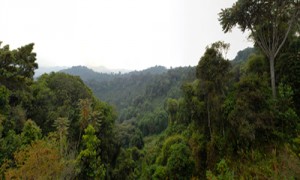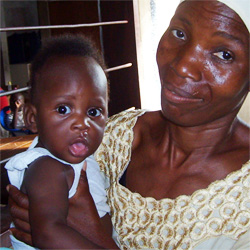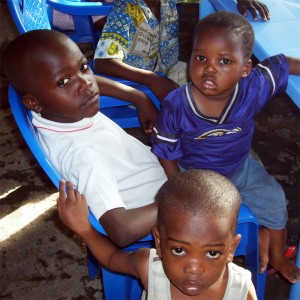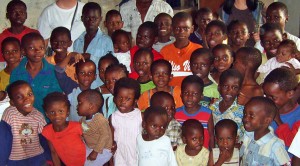|
|
This program is closed. Please contact Children of All Nations to learn about other programs that could be a good fit for your family.
DR Congo (DRC) Adoption
About DR Congo Adoption
 The Democratic Republic of Congo is located in Central Africa and was known as Zaire until 1997. It also goes by the names DR Congo or Kinshasa-Congo, after its capital city, which is the third largest city in Africa. The Democratic Republic of Congo, or DRC, is the third largest and fourth most populous country in Africa, with over 68 million people. The DRC is bordered by the Central African Republic, Sudan, Uganda, Burundi, Zambia, Angola and the Republic of Congo. Some of the country also borders the Atlantic Ocean, and its capital, Kinshasa, is located on the Congo River. The DRC, despite being the second-poorest country in the world, is rich in natural resources. However, much of the country’s economic potential still remains to be unlocked. CAN staff members often travel to DRC to visit our partner orphanages and meet with our DRC team to keep the program running smoothly. We feel an urgent need to help the children of one of the world’s poorest countries and are confident that our DRC team will provide families with a safe, enjoyable experience when they travel to pick up their adoptive son or daughter. Our DRC team is comprised of a several individuals who have experience in social work and adoption, and they truly have the children’s best interest at heart. The Democratic Republic of Congo is located in Central Africa and was known as Zaire until 1997. It also goes by the names DR Congo or Kinshasa-Congo, after its capital city, which is the third largest city in Africa. The Democratic Republic of Congo, or DRC, is the third largest and fourth most populous country in Africa, with over 68 million people. The DRC is bordered by the Central African Republic, Sudan, Uganda, Burundi, Zambia, Angola and the Republic of Congo. Some of the country also borders the Atlantic Ocean, and its capital, Kinshasa, is located on the Congo River. The DRC, despite being the second-poorest country in the world, is rich in natural resources. However, much of the country’s economic potential still remains to be unlocked. CAN staff members often travel to DRC to visit our partner orphanages and meet with our DRC team to keep the program running smoothly. We feel an urgent need to help the children of one of the world’s poorest countries and are confident that our DRC team will provide families with a safe, enjoyable experience when they travel to pick up their adoptive son or daughter. Our DRC team is comprised of a several individuals who have experience in social work and adoption, and they truly have the children’s best interest at heart.
Governance of DR Congo Adoptions
The Democratic Republic of Congo is not party to the Hague convention. Adoption in the DRC is facilitated under the Ministry of Justice, with individual cases being handled by the Tribunal de Paix in the region where the child is from. Children of All Nations is directly accredited by the Ministry of Gender. This special relationship allows CAN to offer families excellent service in every step of the adoption process. If you would like more information about our DRC program, our contact an adoption consultant today at (512)323-9595 or send us an email!
Children Available
 Famine and disease, including AIDS, are leading causes of death in the Democratic Republic of Congo, leaving thousands of children without parents. It is estimated that 15% of children under the age of 18 are orphans in this country of 68 million people. Many children cannot afford to attend school due to poverty, thus are left to the streets or orphanages if they have no living relatives. Food is coveted, and luxuries are non-existent for Congolese children, as poverty is rampant in the country.Children available for adoption from the DRC range from infants to 16 years old. Sibling groups are also available for adoption. Congolese children are of African decent. When selecting a child, consider you may adopt the following: Famine and disease, including AIDS, are leading causes of death in the Democratic Republic of Congo, leaving thousands of children without parents. It is estimated that 15% of children under the age of 18 are orphans in this country of 68 million people. Many children cannot afford to attend school due to poverty, thus are left to the streets or orphanages if they have no living relatives. Food is coveted, and luxuries are non-existent for Congolese children, as poverty is rampant in the country.Children available for adoption from the DRC range from infants to 16 years old. Sibling groups are also available for adoption. Congolese children are of African decent. When selecting a child, consider you may adopt the following:
- Boys and girls infants-teens
- Two to three siblings or unrelated children at one time
If a family is adopting two children, we must receive both referrals within 6 months of each to be able to travel at one time to pick up the children. If the referrals come more than 6 months apart, you must travel twice or move forward with one.
Children of All Nations is also proud to be an advocate for children exposed to HIV. The Gift of Hope: HIV/AIDS program provides education, resources and advocacy for children effected by HIV/AIDS. To learn more, please visit our Gift of Hope webpage.
If you would like more information, please give us a call today at (512)323-9595 or send us an email! DR Congo's Waiting Children
Special needs and older children, as well as sibling groups, are also desperately in need of loving homes. CAN works with partners in DRC to advocate for older children/siblings and children with HIV or other medical conditions through our Waiting Child Program. CAN staff searches for potential matches for the children with families in process with CAN, or those who have a Waiting Child Profile on file with our agency.
If a child is identified by your family, initial investigation is completed for the child to determine eligibility for international adoption. Due to the poverty level of the country, this initial determination is completed after a potential adoptive parent is identified due to fees involved with the process.
The children may be identified by your family from the listing we receive either pre or post-dossier submission.
Families interested in participating in viewing the children available will need to have requested a guide and password from CAN. Completing this form will provide your family with a password and provide us with information to review files on your behalf in search of a good match. For more information concerning DRC’s waiting children, please call us at (512)323-9595 or send us an email. DR Congo Adoption Requirements
In addition to the USCIS eligibility requirements for prospective adoptive parent(s), the Democratic Republic of Congo has the following adoption eligibility requirements. If you feel you are not eligible to adopt from DRC, or you are unsure, please contact us for a free case-by-case consultation regarding your Democratic Republic of Congo adoption.
- Citizenship: One adoptive parent must be a US citizen.
- Age: Applicants must be at least 25 years old and 15 years older than the child they plan to adopt.
- Marriage Status: Married couples are eligible to adopt once they have been married for at least 5 years. There are no prior divorce restrictions.
- Previous Children: Families with three or more children in the home may adopt upon obtaining a waiver from the Congolese government. There is no guarantee that a waiver will be granted. Please consult a CAN representative to learn more.
- Income: There is no minimum income required. However, you must meet the income requirements provided by USCIS for the child to immigrate.
- Criminal History: Applicants with a criminal history of child abuse, violence or domestic violence are not eligible to adopt.
The Democratic Republic of Congo’s adoption eligibility requirements are subject to change per DRC’s adoption laws. CAN updates these guidelines as necessary.
If you would like more information about our program, our specialized adoption consultants are standing by to help! To have your questions answered, call us today at (512)323-9595 or email us. Adoption Timeline
 The time frame to complete international adoption from the DRC is currently about 16 to 28 months, depending on the time families take to complete their dossier paperwork, their preferences for age and gender, and country processes. The time frame to receive a referral for a child is 4-10 months. Right now it is holding steady at only 4 months! These time frames are subject to change, so please consult CAN for the most current processing times for your adoption from DRC. The time frame to complete international adoption from the DRC is currently about 16 to 28 months, depending on the time families take to complete their dossier paperwork, their preferences for age and gender, and country processes. The time frame to receive a referral for a child is 4-10 months. Right now it is holding steady at only 4 months! These time frames are subject to change, so please consult CAN for the most current processing times for your adoption from DRC.
The Process
1. Application and Approval
To adopt a child, please complete our online agency application. If you have any concerns about eligibility requirements, please contact us before filling out this application. We will review your eligibility to adopt from DRC based on the guidelines of DRC’s adoption eligibility requirements once we have received your application. If approved, we will provide you with our agency contract that outlines our fees, services and important information regarding the international adoption process. If you would like to learn more about fees before signing a formal contract, we will be happy to send you a sample contract to review. Upon receipt of your signed contract, CAN will start to provide you with placement services for a child from DRC.
2. The Paper Chase
Once your agency contract is in place, you will be assigned to an adoption counselor and begin assembling your dossier. This will include a home study, which will assess your readiness for international adoption from the DRC and help prepare you for adoptive parenthood, filing with USCIS for international adoption approval, and gathering your necessary dossier documents. These dossier documents must go through the appropriate notarization and certification, as well as authentication by the Congolese Embassy in the U.S. Your dossier will be reviewed and assembled at our headquarters in Austin, TX, before being sent to the adoption authorities for approval. CAN offers a complete Elite Dossier Service to ease your international adoption process and give you peace of mind.
To ensure that prospective adoptive parents are prepared for their international adoption journey, our agency requires that parents complete 10 hours of adoption training as mandated by the Hague Convention. To satisfy these hours, we have developed an online parent training program that we are proud to include in CAN’s service plan. For an overview of the program, please click here.
3. Identifying a Child
CAN’s experienced staff works with our representatives in country to carry out all adoption proceedings. CAN will make the request on behalf of the prospective adoptive parents in the region where the child they desire (or referred) resides. When matched with a child based on your preferences, you receive photos and information on your child. There are two ways to receive a referral:
1. You may request to be matched with a waiting child. Your adoption counselor at CAN and our in country representative will work together to submit your request to adopt your child to the commune. No travel to the DRC is required at this time, but you will travel to bring your child home.
2. You may choose to complete your dossier first and be matched with a child within your adoption desires (not from the waiting list). Your adoption counselor at CAN and our in country representative will work together to submit your request to adopt your child to the commune. No travel to the DRC is required at time of referral acceptance, but you will travel to bring your child home.
4. Picking up Your Child
You will be required to travel to the Democratic Republic of Congo for a short trip to pick up your child and apply for their visa. First, a hearing will occur after all consent for the adoption has been given at the Tribunal de Paix in the region where the prospective adoptive child resides. Paperwork is submitted to the court where your child will be represented by Children of All Nation’s experienced attorney. If a family is adopting two children, we must receive both referrals within 6 months of each to be able to travel at one time to pick up the children. If the referrals come more than 6 months apart, you must travel twice or move forward with one.
Following this hearing an investigation is ordered to make certain that all conditions for final adoption have been met. Once this entire process is completed the judge issues an adoption decree. Parents or CAN’s lawyer will then complete paperwork for their child’s immigration visa from U.S. Embassy in Kinshasa. Once the visa appointment is set, parents will appear in person to request their child’s visa, and then obtain exit permission from the Congolese government, and accompany their child home. The estimated trip time to the DRC is 1-2 weeks.
5. Post Adoption Requirements
Congolese law does not require any post-adoption reports, but the orphanage requires two post-adoption reports at 6 and 12 months. These reports demonstrate to the DRC government and the child’s orphanage the benefits of international adoption for their children. Orphanage Information
 Children of All Nations has chosen to work with orphanages that provide quality care for their children. There are approximately 30 to 130 kids in each orphanage, but does not necessarily mean all of the children are eligible for adoption. Orphaned children are cared for by caregivers at orphanages in the DRC. These are often women who are widows themselves that can empathize with the child’s sense of loss. A few men also work at the orphanage for safety and maintenance reasons, and provide children a male role model. Although the caretakers nurture the children as best as they can, they are extremely limited in resources. Most orphanages do not have enough beds for children to each have their own so many children must share. Children are able to receive basic medical care, if needed, and are tested for HIV, Hepatitis, and other communicable diseases. Children of All Nations has chosen to work with orphanages that provide quality care for their children. There are approximately 30 to 130 kids in each orphanage, but does not necessarily mean all of the children are eligible for adoption. Orphaned children are cared for by caregivers at orphanages in the DRC. These are often women who are widows themselves that can empathize with the child’s sense of loss. A few men also work at the orphanage for safety and maintenance reasons, and provide children a male role model. Although the caretakers nurture the children as best as they can, they are extremely limited in resources. Most orphanages do not have enough beds for children to each have their own so many children must share. Children are able to receive basic medical care, if needed, and are tested for HIV, Hepatitis, and other communicable diseases.
Although many orphanages provide schooling, it is not often adequate for children to maintain the same level as their peers who attend a public school. Children living in orphanages often do not attend public school due to the expense. CAN is currently offering a tutoring and counseling program at one of our DRC orphanages for children age 3 and up. This program, called Jump Start, is aimed at teaching basic English and preparing children for the adoption transition. We are delighted to have formed this partnership and are able to hear weekly progress reports about the children. The children are thirsty for knowledge and love Jump Start! Our tutor writes, “In general, the kids like so much the school and I always have a problem to have school done. They want me to keep on teaching them and they never seem to get tired. They are all able to practice every thing they are taught. I told them about their new families, they were happy to hear that and some of the kids were asking me when they are supposed to meet their adoptive families. I heard some of them telling their friends that my mom and dad live in America; there, I am going to have good food, nice clothing, and nice stuff, they were talking even about things they do not know.”
Resources
Books for Parents
DRC History and Culture
Raising a Transracial Child
Adoption in the Classroom
Issues in Adoption
Children’s Books
Stories from Peru
Articles
-
- Adoptive Families, the online adoption and parenting guide, has provided trusted adoption information and inspiration to families for over 30 years.
Websites
Travel
Government & News
Culture
Official State websites
Health and Wellness
Support and Education
|
